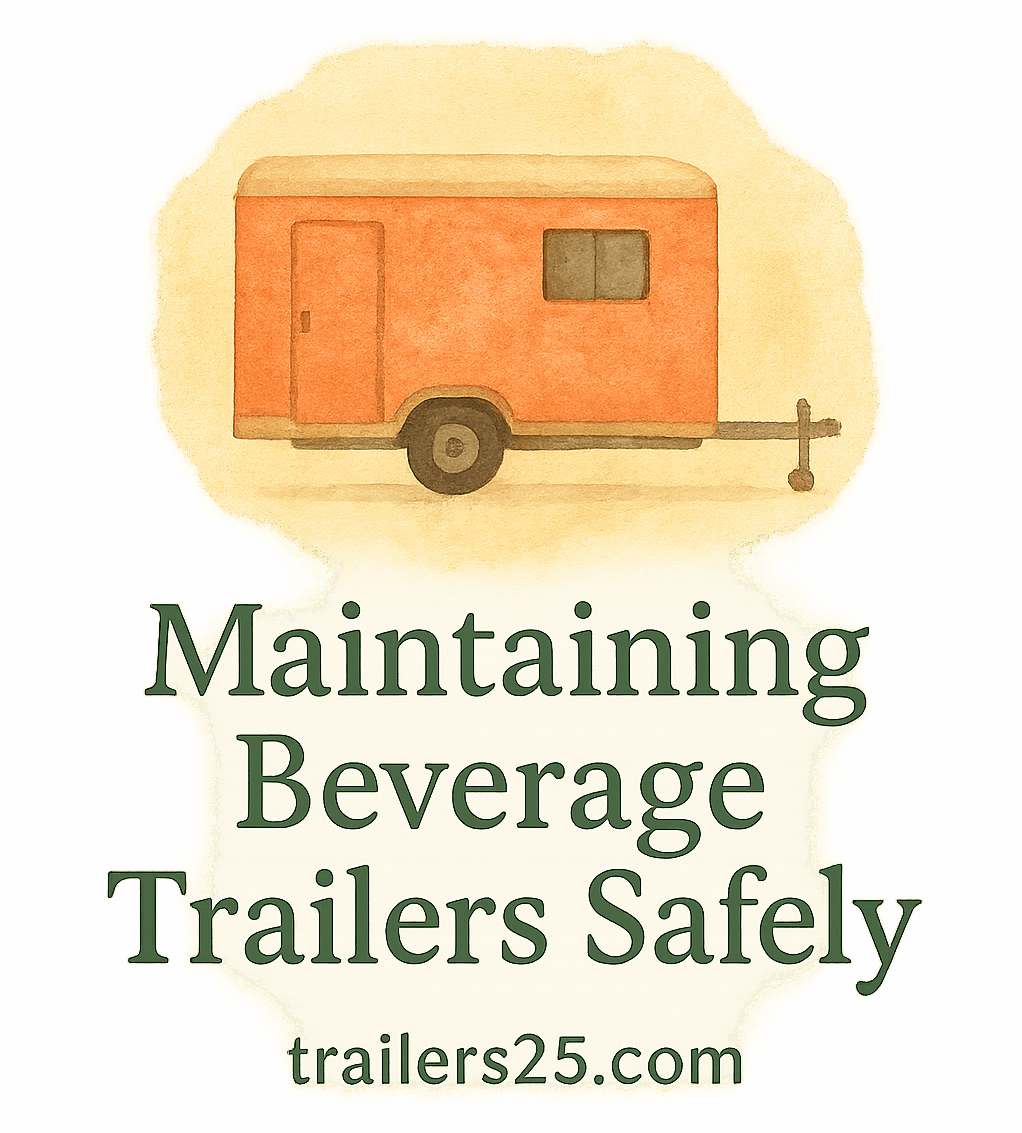Buying a used beverage trailer can be a game-changer if you’re starting or expanding a mobile drink business. It’s often more affordable than buying brand-new equipment, but here’s the truth—what looks like a bargain could end up being a money pit if you don’t inspect it carefully.
In this guide, we’ll walk through the 8 things to inspect before purchasing used beverage trailers, along with extra tips, cost-saving strategies, and compliance advice. By the end, you’ll know exactly how to spot a smart buy and avoid common mistakes.
Why Inspecting a Used Beverage Trailer Matters
A used trailer can save you thousands upfront, but it could also cost you double in repairs if you overlook key details. Think of it like buying a secondhand car—you wouldn’t sign the papers without checking the engine, right? The same rule applies here.
Before committing, you need to consider buying guides, safety compliance, and even potential maintenance needs.

1. Trailer Frame and Structural Integrity
The frame is the backbone of your beverage trailer—weak structure means unreliable performance.
Signs of Rust and Corrosion
Check underneath the trailer and around the joints. Rust spreads fast, and once corrosion takes over, repairs are expensive.
Welding Joints and Weak Spots
Inspect welds for cracks or sloppy jobs. Strong joints are crucial for durability, especially when hauling heavy beverage equipment.
Tip: Explore more insights in our trailer buyers guide to understand what structural red flags to avoid.
2. Floor Condition and Material
The floor sees daily wear and tear from spills, kegs, and foot traffic.
Wooden Floors vs. Metal Floors
- Wooden floors are cheaper but prone to rot.
- Metal floors last longer but can corrode without proper care.
Common Floor Damage to Look Out For
Soft spots, holes, or warped surfaces suggest hidden damage.
Check our maintenance guide for tips on extending your trailer floor’s lifespan.
3. Electrical and Lighting Systems
Nothing ruins operations faster than faulty wiring.
Interior and Exterior Lighting
Make sure all lights function, including emergency lights. A broken system could fail trailer safety checks.
Power Outlets and Wiring
Test outlets with equipment. Exposed or frayed wires are a serious fire hazard.
4. Plumbing and Water Systems
Clean water supply is non-negotiable for beverage businesses.
Freshwater Tanks and Pipes
Inspect tanks for leaks or cracks. Poor plumbing may violate food safety regulations.
Drainage and Wastewater Systems
Ensure wastewater drains properly. Blocked pipes could cause contamination and health violations.
5. Cooling and Refrigeration Units
Your refrigeration is the heartbeat of your beverage trailer.
Performance Test Before Buying
Don’t just trust the seller—run refrigerators for at least 30 minutes.
Maintenance History of Cooling Systems
Ask for servicing logs. A poorly maintained unit may quit on you right after purchase.
Pro tip: Learn about common issues that affect cooling systems before investing.
6. Tires, Axles, and Suspension
Road safety is just as important as customer service.
Tire Wear and Alignment
Uneven wear signals bad alignment, which could point to frame or axle issues.
Axle Strength and Suspension Health
Weak suspension affects towing stability and could lead to accidents.
Explore trailer repair tips if you spot minor issues that need fixing.
7. Safety and Compliance Features
Your trailer must meet legal requirements before hitting the road.
Fire Extinguishers and Emergency Exits
Check extinguisher dates and test emergency exits.
Legal Compliance and Licensing
Each region has its own trailer rules. Make sure paperwork is in order to avoid costly shutdowns.
8. Overall Cleanliness and Hygiene
Customers expect beverages from a clean, safe environment.
Food Safety Standards
Surfaces should be non-porous and easy to sanitize.
Signs of Mold or Contamination
Mold = immediate red flag. It shows neglect and potential health code violations.
Get more tips in our food safety resources.
Additional Tips for a Safe Purchase
- Ask for Maintenance Records – Past repairs reveal how well the trailer was cared for.
- Bring a Professional Inspector – If in doubt, hire an expert to spot hidden issues.
For more safe purchase tips, check our dedicated guides.
Common Mistakes to Avoid When Buying Used Beverage Trailers
- Skipping a full inspection.
- Failing to check legal compliance.
- Choosing the cheapest option without factoring long-term costs.
Cost-Saving Strategies Without Compromising Quality
- Buy during off-peak seasons.
- Negotiate extras like spare parts.
- Explore affordable tips for stretching your budget.
Where to Find Reliable Used Beverage Trailers
Check trusted sources like Trailers25.com, which offers detailed buying guides, maintenance tips, and advice on customization upgrades.
Conclusion
Buying a used beverage trailer isn’t just about finding a good price—it’s about finding one that’s safe, compliant, and ready to generate income. By carefully checking the 8 inspection points—from structural integrity to refrigeration and hygiene—you’ll save money and headaches down the road.
Invest wisely, and your trailer will serve as the mobile hub that fuels your business success.
FAQs
What is the lifespan of a used beverage trailer?
With proper maintenance, many last 10–20 years.
How do I know if the refrigeration system works properly?
Run it for at least 30 minutes to confirm consistent cooling.
Should I buy from a private seller or dealer?
Dealers may offer warranties, while private sellers often provide better prices.
Can I customize a used beverage trailer after purchase?
Yes! Explore trailer upgrades and modifications to fit your brand.
How often should a beverage trailer be serviced?
At least every six months, depending on usage.
What legal documents should I request before buying?
Title, bill of sale, and compliance certificates for regulations.
Is financing available for used beverage trailers?
Yes—many dealers and financial institutions provide financing options.
